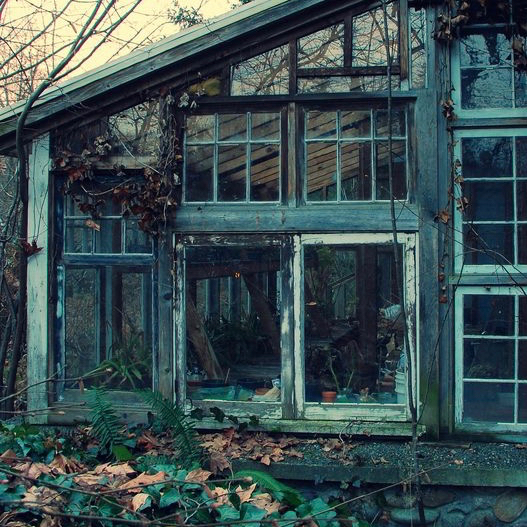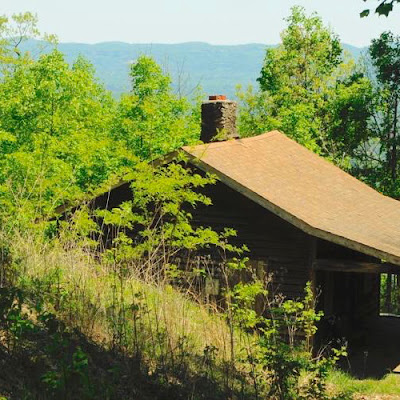Homesteaders - The Homesteader that Hated Summer
What could food security look like for a homesteader who hates summer?
A woman in Missouri contacted me and told me her story. She moved to the Ozarks in southern Missouri when land was cheap and back-to-the-land was the hippie anthem. Several friends also bought land in the area and together they barn-raised many homes, gardens, pig pens, and chicken coops. There was a large movement of young people buying rural land in the 1960s and 70s, sometimes together and living communally, with the hopes of producing for their own needs and escaping a mainstream whose values they did not share.
Regarding food production and farming, this woman says most people would say the Ozarks has four seasons, but she narrows it down to two: bug-season and not-bug season.
Meet long-time Ozark homesteader Abigail. Abigail hates bug season. With a passion.
Abigail wanted to grow her own food and live off her beautiful land. In 1972, she moved into a rough cabin, shoring up the roof, tacking up plenty of newspaper inside for insulation, and sandwiching it in with plywood walls. The first few years were taken up with creating some gardens, building a small stone spring house over her natural spring, canning blackberry jam from fruit collected from wild brambles, sewing a quilt from old clothes, and learning from old-timers how to forage edible and medicinal plants, butcher a pig, and cook on a wood stove. Making art, making love, making do, and making a statement were all a part of daily life.
Most back-to-the-land hippies did not make it past two years. Some would make it through marriage and baby-having and eventually shift from the dream of self-sufficiency to town jobs as inflation set in and prices for even the barest necessities required regular outside income, more than odd jobs and egg money could cover.
Abigail explained that she was very active in her community when it came to building infrastructure (cabins, gardens, dirt roads, well houses, outhouses). She even worked a little in the nearest town during the tourist season to get by and was well-trusted and considered reliable - even though she was a hippie. But she also described herself as something of a loner. She had partners but never found a permanent mate. She preferred solitude, the sound of the wind and rain and birds, and her stash of books. This desire for peace and quiet kept her on her land, and she worked hard to make it as self-sufficient as she could.
But for years, as winter melt turned roads to mud, birds returned to build nests, and the trees suddenly covered themselves in tiny green buds - when most people looked forward to warmer weather and the bounties to be foraged, grown, harvested, and preserved for the next winter - Abigail dreaded the discomfort the changes would bring: bugs, stifling humidity, and hot weather. "I might have been more at home in the Siberian tundra," she joked.
"We 'dropped out' and then some people started dropping out of what we made. I guess maybe they were dropping back in," Abigail remembered, "I didn't want to go back. For my own sanity, it was work out how to spend less time out in the heat. It was wearing me out. I might have been getting a little depressed thinking 'this is my life forever', loving half the year and hating the other half."
Abigail had learned early on to make compost and keep her garden beds healthy. The hills were rocky but with pockets of rich, fertile soil. She had built a sunroom onto the cabin using reclaimed windows (dubbed the Windows on the World or WOW). The room was used both as a sitting room in winter where she could read in the warming light of the sun and for storage. The houseplants did beautifully there in winter and a tree nearby provided enough dappled shade in summer to keep the room from being unbearable. Abigail realized it would make a perfect winter greenhouse.
"The garden still did tomatoes, melons, beans, and squash, but I foraged from February to November so it dawned on me that I was working too hard over the worst part of the year to grow everything. The hills already gave fruit, nuts, and greens. Persimmons, pawpaws and loads of berries. And pecans and hickory nuts. WOW became a winter garden with big pots of spinach, collards, carrots, and turnips. I canned tomatoes and dried beans and kept squash in the rafters for winter. I stored turnips and carrots in a root cellar to last the summer. There was no use keeping greens. From inside or out, greens were plenty."
Animals had their own seasons, but from day-to-day, their care was pretty much the same, season to season. Even in bug-season, it wasn't as grueling as the crop gardens.
Taking a walk to gather greens and berries could be done on cooler days and included a dip in a pond or stream and maybe some fishing, but gardening had to be done every day and both had chiggers and ticks. "But I'd rather look for ticks after a walk and a swim than after working in the garden day after day." Minimizing her summer gardening from a cleared field to four raised beds closer to the house made her much happier.
"I just looked at the bugs on the window screens with a cold drink in my hand and stuck my tongue out at them."
Abigail says she buys very little food in town. She used to hunt and trap more, but these days she is either gifted some venison or rabbits or she'll buy chicken or beef from a neighbor. She still loves to go fishing.
"I still hate summer, but I hate it less because I work out in it less. My summer work has been very little for almost 40 years. Part of that may be because we all came here when the old people were still here and they taught us how to live on the land as they did. By the 1960s, people were buying more of what they needed in the towns, but there were always those hill folks who rarely reached out to town. If you could get to know them, safely and gently, they'd teach you what their people had been doing for 200 years. And it turns out, people who have lived without air conditioning for 200 years know how to avoid killing themselves in the Ozark summer heat just to eat."
When I mentioned the term food security to Abigail in this context she said,"They've known how to be secure for food year-round. There's food to be had in every season. It just took me some time to work out I didn't have to make it all happen for the whole year during bug-season."
Because of renewed interest homesteading, several brave young couples who heard about Abigail made it all the way up to her cabin on the ridge asking to learn from her. They have since relocated nearby to start their own homesteads. They help with Abigail's heavy work, who is now 75, in exchange for the teachings she gives them regarding how to live wisely and comfortably, bug-season or not-bug season, in the Missouri Ozarks.


Comments
Post a Comment